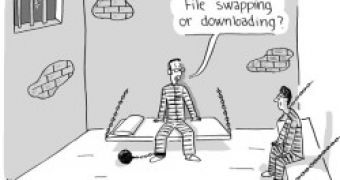How often does it happen that you may choose a low-quality product simply because it is more famous that its competitors? According to Duke University scientists, this happens quite often.
This is a relatively unexplored market phenomenon: what is the importance of the "leader-driven primacy" on consumer choice.
Many economists used to argue that advertising may not be such an important factor and that people in the marketing business tend to overestimate its power. It is argued that it does not matter that a certain advertising clip has convinced you to buy one product, once. If you don't like it you would definitely not buy it again, no matter how many more commercials you will see. And most products, from food to shoes, to cars, to computers, to software etc., in order to be successful, need to be sold many times. Moreover, if you dislike a product there's a chance you will share your opinion with your friends and acquaintances, and the opinion of a friend bears more weight than a commercial.
However, what happens in a new branch of business?
In the lab
"Our research shows how information order can be used to create a tentative preference for one option over another," explain the Duke University researchers. "Once a leader emerges, consumers build support for it by biasing their interpretation of new information to favor it. The consequence of this process is that it is possible to dictate which brand consumers ultimately select, merely by changing the order of the information."
The team examined leader-driven primacy using backpacks, winter coats and restaurants. In one study, two options were intentionally made to be equivalent overall. In another, one choice was markedly superior.
Nonetheless, in both studies, the researchers were able to influence which brand was favored - the first to come had the benefit of reputation and this outweighed even quality.
Such studies are interesting especially from the point of view of the dispute surrounding the legitimacy of copyright and patent laws. A growing number of economists argue that these laws simply grant the right to a monopoly (the so-called "intellectual property") and hurt the interests of the average population. At large, we all have the interest that firms compete with each other, because competition leads to improvements in quality and lowers the prices. Thus, we don't have the interest of allowing one company to patent its innovations and to use these patents to stifle competition, so other companies could not replicate and improve on "their" innovations. One could not own an idea; one can only own a physical manifestation of an idea (such as a CD, a car etc.).
Against this point, many argue that if the copyright and patent laws would be absent, the innovator would not be able to benefit from one's own creativity because others would simply copy ("steal") one's idea. Thus, it is argued, innovators would abandon before they start.
However, this study supports the exact opposite idea: It appears that customers are willing to support the first innovator even when its product is of lower quality than the imitators' products! Why are we doing it?! Who knows? The point is we are.
Out in the real world
This point can be seen very clearly even outside the psychology lab, out in the real world, in cases when innovators have voluntarily chosen to opt out of the copyright law. A great example is Linux.
Two economists, Michele Boldrin and David K. Levine, write:
"Because it is open source, Linux may be resold commercially, but only if the source code is made freely available, including any modifications made to the original program. For example, Red Hat is a company that sells a modified and customized Linux system with easy installation and many other useful features. Although the underlying Linux system is obtained by Red Hat for free, the customization and testing conducted by Red Hat is costly. Using prices quoted on the Internet on July 10, 2002, Red Hat charged $59.95 for a package containing its system. Because it is based on the underlying Linux system, Red Hat must also make available its code to competitors. As a result, anyone who wishes to can sell their own "Red Hat" system. And, in fact, there were at least two companies, Hcidesign and Linuxemporium, that did exactly this. For example, on July 10, 2002, Hcidesign offered for sale Red Hat Linux 7.2 for a price of $16.00, about 1/3rd of the price charged by Red Hat. Linuxemporium.co.uk offered a similar deal.
So how does Red Hat stay in business? For starters, they of course, the striking fact is that Red Hat sold many more $59.95 packages than Hcidesign and Linuxemporium sell $16.00 packages. Moreover Red Hat is a large well known company, while no one has ever heard of the other two, nor does it appear that they ever represented a dangerous market threat to Red Hat. Why you ask? We would ask you: if you had a problem with software you bought, who would you prefer to call for advice - the people who wrote the program, or the people who copied it?
The story is not over yet, please bear with us. Taking two years in writing the second draft of a book chapter is not a proof of high productivity, but there is a silver lining. We just went back to the Internet and checked what happened to these three companies. As of September 23, 2004 all three of them still exist. After years of having all its innovations mercilessly "pirated" Red Hat is still the market leader, it has a world wide web of offices, and it sells lots of Linux-based software products while also giving away lots of others for free. Hcidesign, in spite the advantage of being a legal pirate does not seem to have done very well; it is still there, but it is selling very few products and not just Red Hat but all Linux-based products are off its shelves. Linuxemporium, which can be found at the same web site has either changed its name to or been acquired by ChyGwyn. [Meanwhile, in November 2005, Chygwyn had sold Emporium to Thyme/Clockwork.] ChyGwyn is thriving. Indeed, it has pioneered an entire new line of business: it sells at positive prices software that is downloadable for free from the original companies. The power and creativity of competitive markets sometimes surprise even us!"
Another argument in favor of copyright is that "pirates" would simply sell what proves successful and thus avoid any losses. However, the very fact that something is successful means it has been already sold in great numbers and it already has a public reputation. Thus, the big bucks have already been made. The pirate would only get the scraps. Large earnings are made only by anticipating the unseen wishes of the public.
On the other hand, the pirates also play a beneficial social role: they drive the prices down. This may be bad from the producer's point of view, but it is a great thing from the customers' point of view.
The Boldrin and Levine book, Against Intellectual Monopoly, is a great read and has a large number of real life examples of how copyright and patent laws instead of favoring innovations have actually repressed it. It covers everything from Watt's invention of the Steam engine to Hollywood beginnings as pirates, and to Amazon's patent of the one-click order.
Conclusion
The point is: pirates are breaking the law. And the question is: Who should disappear, the pirates or the law? What's best from the public's point of view? What brings more inventions, increases the quality of products, and lowers the prices? The authors argue it is definitely the law which should be scraped off.
"The goal of economic efficiency is not that of making monopolists as rich as possible, in fact: it is almost the opposite. The goal of economic efficiency is that of making us all as well off as possible. To accomplish this, producers must be compensated for their costs, thereby providing them with the economic incentive of doing what they are best at doing. But they do not need to be compensated more than this. [...] Copyrights and patents are the additional - and unnecessary - right to tell other people what they cannot do with their copies."
Caption photo credits: adpic.de Cartoon credits: Bacon and Velocity Blog (Gabriel and Michelle)

 14 DAY TRIAL //
14 DAY TRIAL // 
